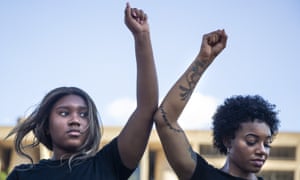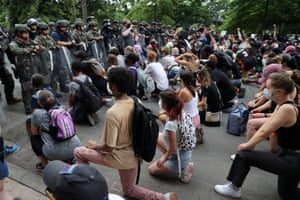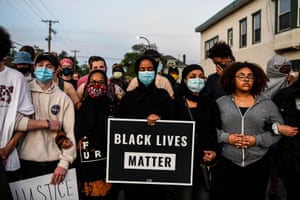‘Apathy is no longer a choice’: will the George Floyd protests energize young voters?
People running for local office say they are seeing a spike in enthusiasm among 18– to 29-year-olds, who historically vote in smaller numbers
- George Floyd killing – latest US updates
- See all our George Floyd coverage

Photograph: Lynda M Gonzalez/AP
With the US presidential election looming, equal rights groups and others on the left say the protests sparked by George Floyd’s death can translate into a surge in young people voting in November.
While Donald Trump’s autocratic response to the demonstrations has shocked young people into action in the US and beyond, advocates believe the movement against police brutality has energized youth voters to think beyond the presidential election, which could have a real impact on state and local elections, where decisions about policing and criminal justice are made.
Around the country, people running for local office say they are already seeing a spike in enthusiasm among 18- to 29-year-olds, who historically vote in smaller numbers than their elders.
“I have so many young kids reaching out to our campaign, saying: ‘How do we volunteer, can I intern to learn more, I’d really like to run for office,” said Nada Elmikashfi, a 24-year-old candidate for state senate in Wisconsin.
“I think whatever political apathy afflicted our generation, it isn’t a choice any more.”
Elmikashfi, who has been part of protests in Madison, Wisconsin’s capital city, said the brutal death of Floyd has “brought a lot of attention on down-ballot races”, but she isn’t sure whether that enthusiasm will carry over to the presidential election, where Joe Biden, the Democratic candidate, has faced criticism for his responses to the demonstrations.

“From conversations that I’ve been having with people my own age, and whether this is right and wrong, it’s this idea that the Democrats are putting Trump as ‘This is the sole reason you should vote for us’,” Elmikashfi said.
“I think constituencies across the country are put in a tight spot, where you have a fascist president who is incredibly destructive to America, but then you also have Democratic party leadership that isn’t very progressive, that doesn’t uplift the working class, but that feels entitled to your vote.
“Young kids understand Trump is more damaging, the question is: is it really gonna change under Biden.”
Biden’s reaction to Floyd’s death, and the ensuing surge in protests nationwide, has included him musing that police officers could shoot suspects in the leg, “instead of in the heart”, a suggestion that seemed to overlook the issue of people of color being apprehended at far higher rates than white people.
The former vice-president, who is 78 years old, struggled to attract young supporters during the Democratic primary, weighed down by a problematic record that includes opposing bussing minority students to different school districts, and his lead role in a 1994 “tough on crime” law that some blame for mass incarceration in the US, and seems in danger of misjudging the level of emotion and the desire for change.
“The death of George Floyd is emblematic of everything that’s wrong with America, whether it’s how we handle Covid, to the existing racism and police brutality that black and brown communities have suffered for years,” said Moumita Ahmed, who is running for district leader in New York’s 24th assembly district.
Ahmed, 30, said Floyd’s death, along with the recent killings of Ahmaud Arbery in Georgia and Breonna Taylor in Kentucky had “opened eyes for a lot of young people”.
“The younger generation are just so much more aware and active and ready to make a difference,” said Ahmed, who co-founded the group Millennials for Bernie, which supported Bernie Sanders during his 2016 and 2020 election campaigns.
“I think a lot of people are going to start paying attention to local elections,” Ahmed said.
“The federal government can do a lot, but the local government has a lot of power in the police departments. They can do so much more than the federal government.”

There is precedent for protest movements prompting real change. In recent years the youth-led protests against gun violence following the Parkland school shooting, led to stronger gun laws, while young climate activists succeeded in drawing attention to the Green New Deal environment legislation, which many Democratic politicians have since endorsed.
On Monday George Floyd’s brother, Terrence Floyd, called for people to vote in November, particularly in statewide and local elections like Ahmed and Elmikashfi’s. That effort to build on the energy of the past two weeks is being supported by organizations like Organizing 2.0, NextGen America and the NAACP, which aims to build equal rights in the US.
Tiffany Dena Loftin, director of the NAACP youth & college division, said it has been registering people to vote at demonstrations, demonstrate how the voting process works and help people find their voting precincts. Loftin said young people had been stunned by Trump’s advocating of violence against protesters and “encouragement of police violence”.
“That is resonating with young black voters across the country, they’re paying attention,” Loftin said.
“They’re fed up and they’re done. So that is definitely a motivation to go to the polls. I want to be clear – it’s not a scare tactic. We’re not afraid of Donald Trump being president for another four years.”
Loftin said the NAACP has also encouraged people to take part in the 2020 census, a once-a-decade event that will influence the amount of government funding neighborhoods receive, and potentially how they are represented in Ccongress. Like Ahmed and Elmikashfi, she said local races are just as important as the headline-grabbing Trump v Biden election.
“There is a laser focus on district attorney races, mayoral races, district races, the president and what their decisions are going to mean for how black folks in this country walk and experience their everyday lives.”
The importance of participating in elections was on the minds of people at a protest in New York City on Tuesday, where thousands walked through Manhattan to demonstrate at Gracie Mansion, the official residence of Mayor Bill de Blasio.
“There’s another stage of this movement that does need to happen. I think voting is important,” said Justin Withers, 23.
“I hope that this does change the voting. I hope it does. We’ve failed in the past but I hope now because it’s so many people that people will finally wake up.”
Just 46.1% of 18- to 29-year-olds voted in the 2016 presidential election, compared with an overall turnout of 61.4%. The highest turnout, meanwhile, was among people aged 65 and over, who are statistically more likely to be conservative.
In the 2018 midterms, the less glamorous elections that re-elect members of the House of Representatives and some senators as well as local officials, 36% of young people voted – although this was a big increase on the 20% of 18 – 29-year-olds who voted in the 2014 midterms.
That could suggest interest and awareness is growing among younger voters. Although Withers, who lives in Brooklyn, predicted that despite renewed enthusiasm, the turnout in 2020 would remain relatively low among people of color – due to efforts in states around the US to make it more difficult for black people, and other minority groups, from voting.
Since the Voting Rights Act was weakened in 2013, many states have brought in laws making it more difficult to vote, from purging people from electoral rolls if they have not voted in a given amount of time, to preventing efforts to register voters, to requiring government-issued photo ID to vote – something people of color and low-income Americans are less likely to have.
“The problem is voter suppression is still happening,” Withers said.
“It’s still 10 times harder for the people who know what’s right, for the people who are minorities, to be able to vote. That’s still a problem. And because of that I know that it won’t be the numbers we want.”




